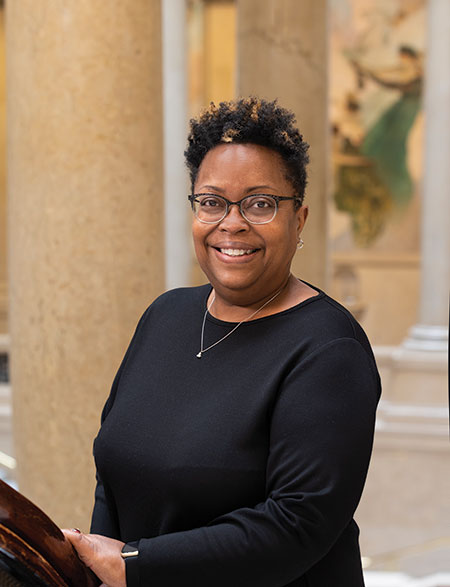
Photo: Joshua Franzos
“My dad tried to convince me to be an engineer or a doctor, but I wasn’t having it,” recounts Geovette Washington, senior vice chancellor and chief legal officer at the University of Pittsburgh and chair of the Carnegie Museums of Pittsburgh’s Board of Trustees. In a legal career that spans three decades, Washington has served as general counsel and senior policy adviser in the White House Office of Management and Budget and as the second-highest-ranking official in the Office of General Counsel for the U.S. Department of Commerce. But when people hear her name years from now, it’s not the titles she hopes they’ll remember. “I hope they remember that I didn’t take myself too seriously and that I did good in the communities in which I lived.” It was that desire to give back that led Washington to become a Carnegie Museums trustee and then accept the role of board chair a year ago. “Every day, there’s something new and different that I learn about each of the museums,” she notes, “and it makes me love each of them in different ways.”
Q: What fueled your desire to go to law school?
A: I watched a lot of Perry Mason as a kid, and I thought it was really cool. That sparked my interest in becoming a lawyer. My father was a principal and would visit the county education offices, which were across the street from the courthouse. I would run over to the courthouse and sit in the back row of the courtroom listening to arguments, figuring it all out.
Q: What was one of the biggest challenges you overcame in your career?
A: I enjoyed being a lawyer who was behind the scenes. I was the perfect Number Two. When I was with the Obama administration, my mentor said, “You need to be out front and center. You need to be leading,” and I thought, “You have lost your mind!” But he kept pushing me. No one believes I am a total introvert, so giving speeches and being Number One was really hard for me to overcome.
Q: How did you overcome it?
A: Sometimes you learn how to swim just by being pushed into the deep end. After I did it a couple times and didn’t fall flat on my face, I thought, “OK, I’ll keep doing it.” I sang in a small ensemble when I was in college, and I loved performing. For me, it’s like performing.
Q: So, you’re a singer, too? In your youth, who would you sing your heart out to?
A: I was a big Jackson 5 person. I was in the background singing for Michael.
Q: What’s the biggest misconception people still have about women in leadership?
A: That we are difficult. Cutthroat. That we’ve given up part of ourselves to get to where we are. I spent a lot of time observing other leaders. When I was a young litigator in private practice, I was at a deposition with another lawyer. Afterwards, he said, “You don’t have to do it the way I do it. You just have to figure out your own style and what you’re comfortable doing.” That was the best advice anyone ever gave me. I didn’t have to be somebody else in order to be successful. I just had to figure out how to do it in my own skin.
Q: Do you remember the first museum you visited?
A: I grew up in rural Georgia and don’t recall museums being a huge part of our cultural life. I didn’t go to the High Museum of Art in Atlanta until I was in college. Even living in D.C., you don’t go to the museums there like you do here. You go when people visit; it’s like a tourist attraction. They’re not as central to the lifeblood of the city as the Carnegie Museums are.
So many Pittsburghers have memories of going to the Carnegie Museums as kids; it becomes part of who they are. This may sound horrible, but the Smithsonians feel like they belong to the nation, not to Washington, D.C. Whereas the Carnegie Museums feel like they belong to Pittsburgh.
Q: Why were you eager to take on the role of board chair for the museums?
A: I thought it was an excellent opportunity to give back to a community that’s given back to me. I came here knowing very few people, having never lived in the city, but was quickly welcomed by everyone. Early on it became clear that the museums were a treasured piece of the region. And this was something I could do for Pittsburgh.
Q: If you had to pick your favorite Carnegie Museum, which would it be?
A: I couldn’t! I mean, it’s just so hard because they’re like four very distinct children who you all love but are incredibly different. But what really surprised me was the dedication of the staff. They are the lifeblood and what makes the museums go.
Receive more stories in your email
Sign upTags:
Facetime Q&A